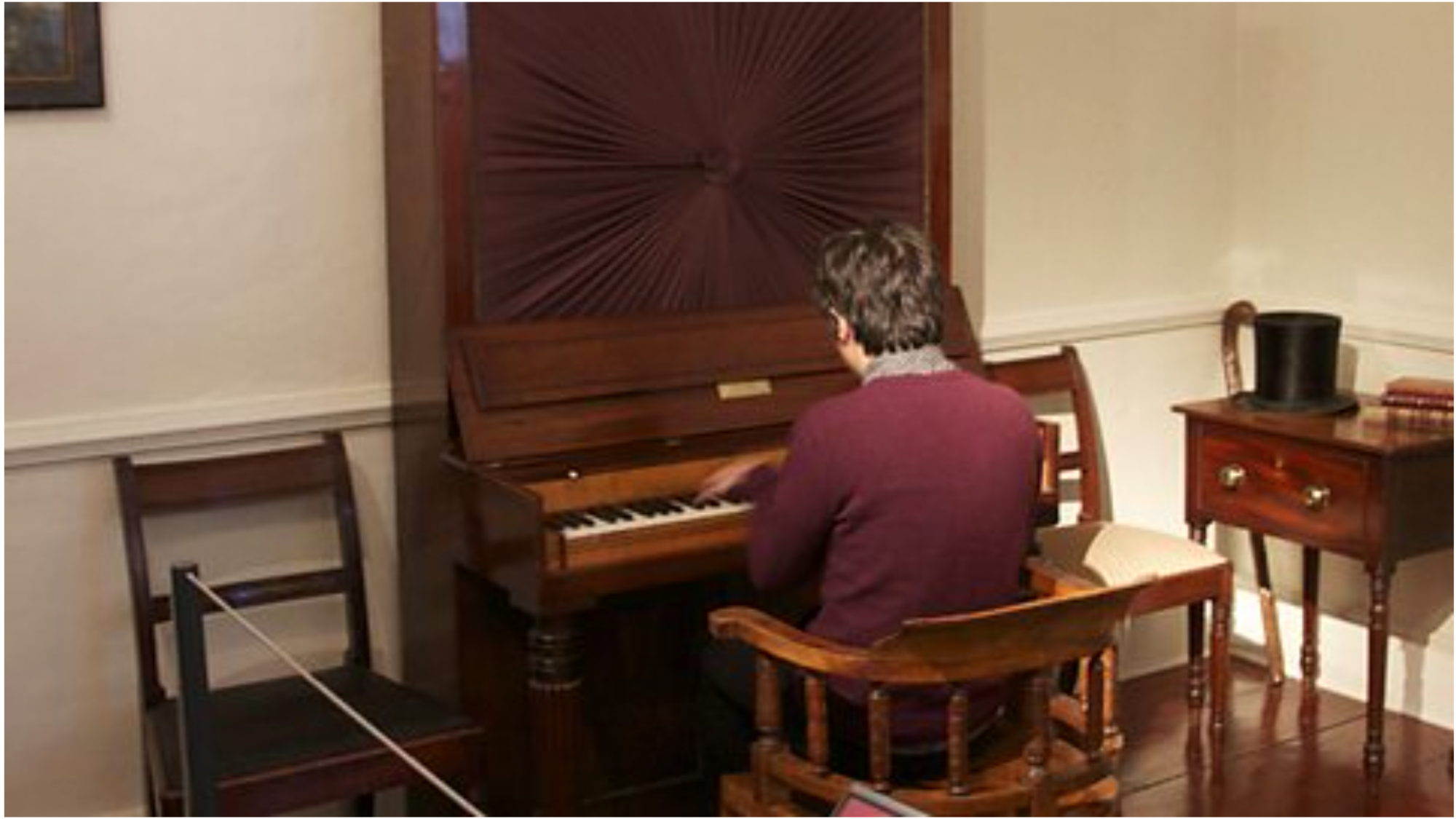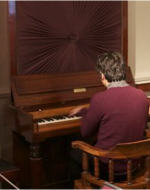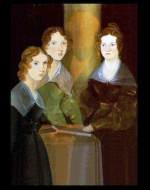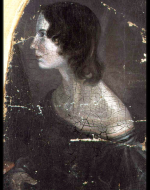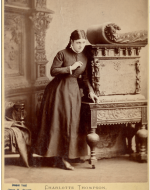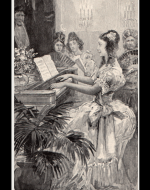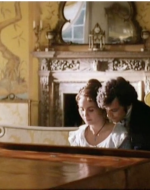Created by Sylvie Novak on Thu, 11/10/2022 - 17:02
Description:
In the Victorian time period, the piano emerged as a symbol of class and skill. Young women were expected to become proficient in piano for multiple reasons, including to attract a spouse, display a family's wealth, and, if working towards governessing, to teach. The Brontë sisters were gifted a piano by their father Patrick Brontë in 1833. While all three women were proficient, Emily took a special liking to the instrument and became a gifted pianist. As all three went on to work as governesses, their piano skills would have been useful. The Victorian piano makes an appearance in Brontë novels, particularly Jane Eyre (1847) and The Tenant of Wildfell Hall (1848). The piano's presence in the sisters' works displays their appreciation for the instrument and their recognition of its important place in the lives of women for teaching and courtship in their Victorian world.
"The Brontë Family Piano in the Haworth Parsonage," 1833, annebronte.org. This image displays the Brontë family piano, which is located in the Haworth Parsonage and is visited by tourists year round. In 1833, the girls were gifted an upright cabinet piano. Donated to the Brontë Parsonage Museum in 1916, the piano underwent a restoration in 2010. According to the Duke University's Musical Instrument Collection, a cabinet piano is a common type in the 19th century. The Piano Company explains that upright pianos, which are no longer in circulation, are typically up to 54 inches tall. They are made to be tall and thin in order to take up less space in a home. The following page feautures a piano from 1810 that has a keyboard made from ivory and ebony and a structure designed from spruce and pine. As this piano dates to the same time period that the Brontë sisters recieved their piano, it is probable that the sisters' piano was made of similar materials. The piano remains a lasting symbol of the Brontës and their vast accomplishments.
Sources: “Cabinet Grand Piano.” Duke University Musical Instrument Collections, https://sites.duke.edu/dumic/instruments/keyboards/west-europe/cabinet-g... Knights. “Bronte’s Piano Will Ring to Music Again.” Keighley News (England), 29 May 2010; “Vertical Pianos.” The Piano Company, 5 Oct. 2021, https://pianoco.com/pianos/vertical-pianos/.
Branwell Brontë, "Anne, Emily and Charlotte," 1834, Wikipedia. The three sisters were all well versed in the piano, aiding them as they began to work as governesses. Musical skill was important for young women in Victorian times, as Catherine Reef describes in The Brontë Sisters: The Brief Lives of Charlotte, Emily, and Anne (2012): "Most Victorian girls were schooled in 'accomplishments' rather than knowledge..." (Reef 25). This expectation points girls towards "feminine" outlets such as music, sewing and artistry. Emily was quite skilled on the piano, while Anne preferred to sing. According to David Knights's "Bronte’s Piano Will Ring to Music Again" (2010), Charlotte, while still playing well, had the most trouble with piano due to her poor eyesight. Knights quotes the Brontë museum's spokeswoman, who says Charlotte's, "poor eyesight proved an impediment to sight reading of music" (Knights). Despite this limitation, all three girls all used the piano in the parsonage.
Sources: David Knights. “Bronte’s Piano Will Ring to Music Again.” Keighley News (England), 29 May 2010; Catherine Reef. The Brontë Sisters: The Brief Lives of Charlotte, Emily, and Anne. Houghton Mifflin Harcourt Publishing Company, 2012; “The Brontës and the Haworth Music Scene - Anne Brontë.” Anne Brontë - In Search of Anne Brontë and Her Family, 22 Feb. 2019, https://www.annebronte.org/2017/06/11/the-brontes-and-the-haworth-music-....
Branwell Brontë, "Portrait of Emily Brontë," 1833, Wikipedia. This piece, created by Branwell Brontë, features Emily, gazing thoughtfully out of the painting's frame. As mentioned earlier in the case, Emily is known as the most talented piano player of the three sisters. A Brontë family friend, Ellen Nussey is quoted as saying, "Emily, after some application, played with precision and brilliancy. Anne played also, but she preferred soft harmonies and vocal music" ("The Brontës and the Haworth Music Scene"). Ironically, a piano is not featured in Wuthering Heights. This lack of music in the novel has not stopped artists like Kate Bush from developing songs related to the text, such as her groundbreaking "Wuthering Heights" (1978). Additionally there are many versions of Wuthering Heights piano scores, which Emily, with her literary and musical skills, would no doubt have admired.
“The Brontës and the Haworth Music Scene.” Anne Brontë - In Search of Anne Brontë and Her Family, 22 Feb. 2019, https://www.annebronte.org/2017/06/11/the-brontes-and-the-haworth-music-....
"Charlotte Thompson in Play Adaption of Jane Eyre," 1874, Wikipedia. The fourth plate is a photograph from an 1874 play adaption of Charlotte Brontë's Jane Eyre (1847). Charlotte Thompson braces her hand against a piano in this image, displaying a strong connection between the heroine and the instrument. Jane, as a fictional Victorian era governess, is skilled at the piano, allowing her to teach her pupils how to play the instrument. This is noted when Jane first arrives at Thornfield Hall and is taken to the library, where she will teach Adèle. Charlotte writes, "Adèle and I withdrew to the library, which room, it appears, Mr. Rochester had directed should be used as the schoolroom... there was a cabinet piano, quite new and of superior tone; also an easel for painting and a pair of globes" (C.Brontë 95). As a governess, Jane is expected to instruct Adèle in piano. Moreover, Jane says that the instrument is a "cabinet" piano, the same type of instrument that Patrick Brontë gave to his daughters. Within Jane Eyre, pianos further romantic plotlines as well.
Brontë, Charlotte. Jane Eyre (1847). Fourth ed., W.W. Norton & Company Inc., 2016.
J. E. Garrett, "Blanche Plays Piano," 1890, linnetmoss.com. Blanche Ingram--the third member of a love triangle involving Blanhe, Jane, and Mr. Rochester--plays the piano to attract Mr. Rochester in one stand-out scene. Jane describes this moment, stating, "Miss Ingram, who had now seated herself with proud grace at the piano, spreading out her snowy robes in queenly amplitude, commenced a brilliant prelude" (C. Brontë 162). The terms "proud grace" and "queenly" indicate the power that Miss Ingram's musical abilities grant her. She is confident in her ability to attract Mr. Rochester's affection and admiration. Whereas a governess used her keyboard skills to instruct her charges, a woman of fashion used her skills on the piano to secure a husband.
Brontë, Charlotte. Jane Eyre (1847). Fourth ed., W.W. Norton & Company Inc., 2016.
Still from The Tenant of Wildfell Hall, 1996 Film Adaptation, dailymotion.com. The piano plays a major role in The Tenant of Wildfell Hall, displaying how pianos can fuel romantic situations as well be a teaching tool. In this film still from The Tenant of Wildfell Hall (1996), Helen and Mr. Huntingdon gather around their piano. As members of the upper class, the piano would be a staple of their home. The piano shown onscreen does not appear to be a historically accurate rendition of a cabinet piano. Within this scene, although Mr. Huntingdon's hands appear to be on the keys, Helen occupies the piano bench, displaying that the piano is a gendered object in the home. Within this novel, Helen's nemesis, Annabella Wilmot, is reportedly very skilled at piano, attracting the attention of Helen's abusive future husband, Mr. Huntingdon. Annabella, for example, "... exultantly seated herself at the piano, and favored [Mr. Huntingdon] with two of his favorite songs, in such superior style that even I soon lost my anger in admiration and listed with a... gloomy pleasure" (A. Brontë 140). Helen, and by extension, Anne herself, appreciates the beauty of the instruments over the hatred she has towards Annabella. The "gloomy pleasure" that Helen feels reflects this chagrined respect for Annabella's abilities. Annabella is using her skills to "favor" Mr. Huntingdon, displaying one of the purposes of the piano in upper-class societies: to woo men. Although Annabella does not ultimately marry Mr. Huntingdon, they do later have an affair, displaying that Annabella's piano skills have, in a way, held Mr. Huntingdon's attentions.
Brontë, Anne. The Tenant of Wildfell Hall (1848). Oxford University Press, 1992.

